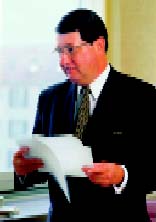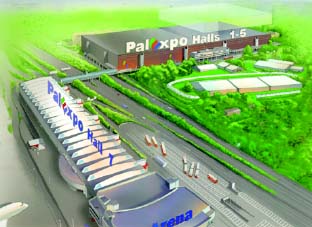Telecom 99 + Interactive 99

ITU Management Team. From left to right (in the foreground), Yoshio Utsumi, Secretary-General, and
Roberto Blois, Deputy Secretary-General. In the background (from left to right), Hamadoun Touré, Director,
Telecommunication Development Bureau (BDT), Houlin Zhao, Director, Telecommunication Standardization Bureau (TSB),
and Robert Jones, Director, Radiocommunication Bureau (BR)
Photo: A. de Ferron (ITU 990050)
In a few days, Telecom 99 + Interactive 99 will open its doors in Geneva. On the occasion of this last most important
event before the turn of the century, the International Telecommunication Union is delighted to welcome exhibitors and
visitors from all over the world to celebrate the past, present and future of telecommunications.
As a showcase of telecommunications since its inception in 1971, Telecom serves, every four years, as a measure of
the progress already achieved and a preparation for the future. In this regard, the exhibition we are about to witness
offers a unique review of the state-of-the-art technology.
The quality of networks and services provided today have improved dramatically with new techniques for management and
with intelligence spread in different parts of what has become a global network. Standards have played and will continue
to play a key role for the prompt introduction of new technology in this global network.
As a forum for developing and agreeing these technical standards, regulating the use of the radio-frequency spectrum
and promoting telecommunication development, the Union takes specific and often novel measures to respond to the
constantly changing landscape of telecommunications.
ITU can justifiably boast of having spent the last one hundred and thirty-four years building the global information
infrastructure. An infrastructure that has fulfilled largely the dream and aspirations of Alexander Graham Bell, who
said in 1878 that: "In the future… a man in one part of the country may communicate with another in a different
place."
Indeed, the ability to call any country of the world from any other is particularly laudable. It will be even more
laudable when all citizens of the world can enjoy access to telecommunications and information technology. This is the
single most important challenge facing the infocommunications industry as we enter the new century.
At Telecom 95, some of the world's leading specialists and representatives of the converging industries of
telecommunications, broadcasting and computing joined ITU in breaking down the barriers towards the global information
society. We look forward to yet another dynamic exchange of ideas at Telecom 99 + Interactive 99 on the way we will
communicate in the future. The bottom line is that we should continually define a framework to allow telecommunications
to do what it does best: overcoming distance and connecting people everywhere.
So, Telecom is not simply a technical show. It is also a way to contribute to development efforts. Inthis regard,
surplus income over expenditure generated by Telecom events is used as seed money for specific telecommunication
development projects, primarily in the developing world.
With the prospects of today's, and even more so, tomorrow's limitless technology, the 21st century should herald a
better life for everyone; not just those who can afford it.

Yoshio Utsumi
Secretary-General
International Telecommunication Union
Telecom 99 + Interactive 99, the ITU-Telecom event being held on the eve of the millennium at Palexpo (Geneva), will
be the biggest and most influential gathering of telecommunication professionals ever seen. The event, which is taking
place from 10 to 17 October, will be the eighth world telecommunication exhibition to be organized by the ITU in Geneva.
Exhibiting over a total ground floor surface of over 66 000 square metres net (63 000 indoors and 3300 outdoors),
1123 exhibitors from 48 countries will offer the 200 000 expected visitors the most influential showcase for all that is
new and remarkable in telecommunication products and services. It will provide the launchpad for products of true
innovation, the kind of developments that will impact and benefit our lives in the years to come.
Based on projections from the attendance at Telecom 95, some 100 ministers, 150 directors-general and 3000 media
representatives are expected to visit Telecom 99 + Interactive 99 in addition to hundreds of chief executive officers
and other top-level representatives of the telecommunications world.
At the event this year there will inevitably be a special focus on the changes that have been wrought — and which
will continue to be wrought — on society by the combined impact of mobility and the Internet. Four years ago the
Internet was on the fringes of the Telecom event and indeed the entire telecommunications business. Today the Internet
and the World Wide Web affect businesses, markets and individuals alike.
Mobile telephony, too, has taken the world by storm in the past four years. At the time of Telecom 95 there were just
18 million digital cellular subscribers worldwide. Now, in 1999, there are more than 300 million digital cellular
subscribers around the world.
In our excitement over this apparently unstoppable growth we should not, however, forget that the vast majority of
the world's people do not yet have access to even basic telecommunication services, let alone the World Wide Web. The
Forum at Telecom 99 + Interactive 99 addresses this issue, and at this year's event we have a broad-ranging and
hopefully far-reaching programme lined up. The Forum this year will comprise four summits and eight combined sessions
covering issues of interest for all the summits.
Finally, on the weekend of 16 and 17 October 1999 the World Telecom Internet Days will close the Telecom 99 +
Interactive 99 event — and lead the way into the new millennium. This event will act as the bridge that leads from the
industrial age to the information age, and will be open to the general public as well as to Telecom's principal audience
of exhibitors, Forum delegates, media representatives and trade visitors.
Telecom 99 + Interactive 99 promises to be a truly exceptional event. I look forward very much to seeing you there.
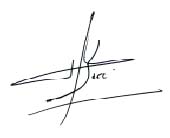
Jean-Patrick Baré

Telecom 71
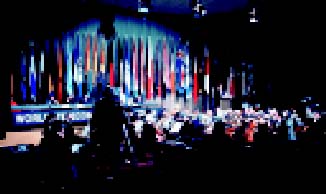
Telecom 75

Telecom 79

Telecom 83
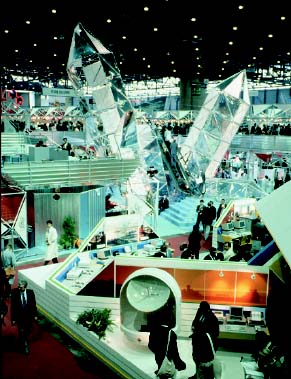
Telecom 87

Telecom 87

Telecom 91

Telecom 91
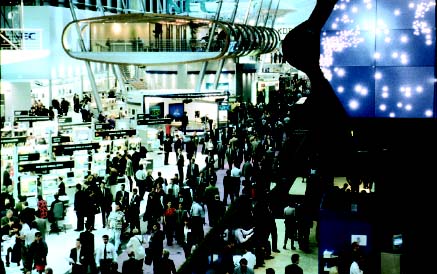
Telecom 95
Allocating space for the eighth World Telecom Exhibition due to be staged in Geneva from 10 to 17 October 1999, was
not easy, given that so many companies made it clear, as early as 1995, that they wanted to show the world their
accomplishments and their novelties on the eve of the new millennium. ITU-Telecom received too many requests for too
little space. But during 1998 it was able, with the help of the Swiss authorities, to develop a project to use a whole
new area in the gardens in front of the Palexpo Exhibition and Conference Centre.
The project, with its covered walkways, will be an integral part of Palexpo for Telecom 99 + Interactive 99.
Consisting of a press centre, four press conference rooms, a television studio, a restaurant and an exhibition hall, the
area is certain to attract many visitors and of course the world's media.
Fully equipped in terms of network connectivity, air conditioning, etc., it will provide all the amenities exhibitors
and visitors to this global event are used to. For the exhibition itself, the project meant an extra 2500 m2,
and will enable Telecom to accommodate part of its long waiting list.
By the end of 1998 it was clear that in total the exhibition would cover 65 000 m² of net floor space, not counting
additional storeys on multi-level stands.
Also, during 1998 the call for speakers for the Forum at Telecom 99 + Interactive 99 was issued, and resulted in more
than 1100 abstracts being submitted to the Forum Programme Committee, which met in February 1999 to shape and define the
Forum.
Since October 1998 the world event has enjoyed wide publicity in the business and trade press.
Telecom surplus funds boost development
Telecom events are staged for the benefit of ITU Member States and Sector Members. But as a business-oriented,
semi-commercial organization within ITU, Telecom also generates income. The Plenipotentiary Conferences of Kyoto (1994)
and Minneapolis (1998) resolved that a significant part of any surplus income over expenditure derived from the
activities of Telecom should be used for specific telecommunication development projects, primarily in the least
developed countries. Some of these projects are highlighted here.
They are managed by the Special ITU-Telecom Development Programme, which complements the activities of the
Telecommunication Development Sector (ITU-D), over and above the activities which are undertaken by ITU under its
ordinary budget.
Projects to be undertaken by this programme are to be carried out in the 1997-2002 time-frame, and can be grouped
into the areas of human resource development, infrastructure development, assistance to countries in special need, and
application of new technologies.
- The human resources development component of the programme focuses on the establishment of four Centres
of Excellence. An amount of CHF 2 million has been allocated by ITU to each Centre of Excellence as seed
funding, and the commitment of these ITU funds will form the nucleus on which substantial further contributions
will be raised, in cash and in kind.
Two of the centres will be sited in Africa, specifically in Dakar and Nairobi, where existing
regional training institutions, the Ecole supérieure multinationale des télécommunications (ESMT) and
the African Regional Advanced Level Telecommunication Training Institute (AFRALTI), are being transformed into
Centres of Excellence.
The other two centres, which are being created in the Americas and Asia-Pacific regions,
differ somewhat from the approach taken in Africa, in that a number of existing training and research institutes
are being linked into a virtual network of Centres of Excellence.
The primary mandate of these Centres of Excellence will be to train public officials in policy
and regulatory issues. They will also be a resource for Chief Executive Officers (CEO) of both established and
new operating companies. Here, CEOs will be able to search out the information they need and network with their
peers.
The centres will also have a number of other valuable functions, including the provision of
training advice and information on the management of the frequency spectrum. Ministers will be able to use the
centres to garner information and advice, particularly where large national and continental projects are
concerned.
There will also be a continuous assessment at the Centres of Excellence of the regional impact
as a whole — and on specific countries of a given region — of multilateral telecommunication agreements.
Moreover, the centres will be places where experts will be available who not only understand the issues involved
but who will be able to dispense advice concerning the best ways of financing telecommunications development in
both general and individual cases.
Finally, the centres will act as regional focal points where pilot projects can be defined and
where demonstrations can be formulated, initiated and discussed. The centres, like the ITU itself, will be a
place where, at the regional level, industry and government can come together to form lasting partnerships.
- The infrastructure development component, to which CHF 4 million has been allocated, will enlist the
commitment and cooperation of national governments, regional and international organizations and the private
sector to modernize the Panaftel network in Africa, and to enhance local and regional manufacturing capabilities
in that continent.
The modernization of the Panaftel network aims to strengthen the capabilities of national
telecommunication operators to develop and better manage, operate and maintain African telecommunication
networks. The project is expected to attract international expertise in the areas of integrated planning of
telecommunications, traffic flows, the gradual digitalization of networks, maintenance and rehabilitation, and
tariffs.
- The amount of CHF 1.5 million has been committed to provide assistance to countries in special need, in
accordance with resolutions which were adopted by the Plenipotentiary Conferences of Kyoto and Minneapolis.
The most recent project being implemented in this component of the programme provides
assistance to the Telecommunication Regulatory Agency of Bosnia-Herzegovina. The project, which is being carried
out in partnership with the European Bank for Reconstruction and Development (EBRD), aims to develop a
short-term telecommunication development master plan for Bosnia-Herzegovina. ITU News has reported
extensively on this project in previous issues.
Projects undertaken in this component of the programme will also address the needs of
countries from the Caribbean and South Pacific regions for emergency standby telecommunication services. The
availability of such services can often mean the difference between life and death in the case of tropical
storms or hurricanes, and the ITU is committed to their provision wherever possible.

Projects undertaken in the 1997-2002 programme
- In the area of application of new technologies, CHF 4 million has been committed as seed funding for
pilot projects which demonstrate and extend the benefits of communications technology to the public.
Projects are currently under way in India and Morocco in the area of tele-education and in
Morocco and Venezuela in the area of electronic commerce. Community multipurpose telecentres are being
implemented in Mali, Uganda, Mozambique, Benin, Tanzania and Viet Nam.
In the field of telemedicine five projects have been implemented in Mozambique, Myanmar,
Georgia, Malta and Ukraine. Several others are under way in Cameroon, Ethiopia, Kenya, Senegal, Venezuela and
Bhutan.
Other proposals are being assessed for application in developing countries, in fields such as
transportation, the environment, tourism, agriculture, efficient government operations and good governance.
Primary school teacher training in Morocco
In 1998, the preparatory work necessary to implement a pilot interactive teacher training project in Morocco was
completed. The project is funded to the tune of more than USD 3.5 million by the Government of Morocco, the World Bank,
an ITU-Telecom surplus contribution and other partners. The project is being implemented by the ITU's Telecommunication
Development Bureau (BDT) under a subcontracting arrangement for infrastructure and technical matters, and the United
Nations Educational, Scientific and Cultural Organization (UNESCO) for programme issues and content.
The project was to establish 15 learning centres in Morocco to be operational in early 1999. By the end of 1998 a
demonstration of very small aperture terminal (VSAT) equipment from Gilat (Israel) was already in Morocco and
local staff had been recruited. The Moroccan telecommunications authority was approached to provide the satellite
segments free of charge.
The pilot project takes advantage of VSAT technology, which allows outward broadcast quality for video, data and
audio but also allows for a return channel for audio and text. VSAT is simplified satellite technology which does not
rely on any existing infrastructure — it also has the added advantage of being relatively inexpensive, particularly
for the return signal. In distance-learning studies, student feedback is essential. So, simple broadcasting technology
is not sufficient, as it does not allow at present for a return channel.
Each remote classroom will therefore be equipped with a class computer as well as simple individual feedback
terminals — like a converted remote control unit — for each student.
The project has been established as part of UNESCO's "Education for All" programme. It uses new information
technology to combine the potential use of television, telecommunications, and computers, and brings knowledge and
learning directly to those who need it most. The project focuses on:
- improving the performance of less qualified teachers;
- enriching teachers' subject knowledge base;
- increasing teacher self-esteem and motivation;
- assessing the use of interactive educational television in developing countries;
- introducing the Internet to learning centres;
- enhancing community recognition of education in development.
A similar project is under way in India, in the states of Gujarat and Madhya Pradesh. Other countries have expressed
their interest in this pioneering endeavour.
Electronic commerce for developing countries (EC-DC)
The ITU's electronic commerce for developing countries project aims to enable developing and least developed
countries to use existing telecommunication infrastructures and services to participate in electronic commerce by
providing a low cost gateway to the global market-place for merchants and small businesses. This can be achieved by
using a distributed architecture that enables many merchants to share the cost of the electronic commerce infrastructure
in their region, thereby increasing the likelihood of sustainability.
Beside the direct economic benefits, EC-DC will stimulate demand for Internet connection infrastruc ture, thereby
complementing other BDT projects such as telemedicine and distance learning. It focuses on well-defined deliverables and
encourages participation of the business and private sectors. It is a concrete example of the thesis ITU has long
promoted that telecommunication development fosters economic development.
Many partners from both public and private sectors have expressed interest in participating financially in the
implementation of EC-DC in their regions. Implementation of at least four EC-DC centres (the first two being in Morocco
and Venezuela) is expected over the next two years.
EC-DC shows business communities in developing and least developed countries the value of the global
telecommunications infrastructure which broadens markets by providing access to an international clientele.
For additional information on this project, please visit the website at: http://www.itu.int/ECDC
Growth in the World Telecom Exhibition since its inception in 1971
|
world event
|
exhibitors
|
net exhibition
space (m2)
|
visitors
|
|
Telecom 71 |
250 |
14 000 |
28 000 |
|
Telecom 75 |
360 |
16 600 |
40 000 |
|
Telecom 79 |
600 |
35 000 |
41 000 |
|
Telecom 83 |
659 |
41 000 |
77 000 |
|
Telecom 87 |
803 |
53 600 |
105 000 |
|
Telecom 91 |
250 |
87 260 |
132 250 |
|
Telecom 95 |
1066 |
99 000 |
154 671 |
This Board was created following the recommendations of the High Level Committee (1990-1991), the body that advised
the ITU on how to streamline and integrate its activities in today's competitive environment. The Board focuses
primarily on providing advice to the ITU Secretary-General concerning technological trends and developments in
telecommunications and related fields, both on a global and regional basis.
 |
Jean-Patrick Baré has served ITU for more than twenty-three years in various capacities in the
human resources management field. From 1990 until 1998, Mr Baré was the Chief of the Personnel and Social
Protection Department. In March 1998, he was nominated President of Telecom and Chairman, Telecom Board.
Since his appointment, Mr Baré presided over the successful Africa Telecom 98, hosted in Johannesburg. This
was ITU's twentieth Telecom event and its fourth in the Africa region. |
 |
Nils Ingvar Lundin is Managing Director, Corporate Communications and Marketing, at Investor AB
in Sweden. Before joining this company in 1995 he was head of Corporate Relations and Senior Vice-President
of Ericsson. He joined Ericsson in 1985 after sixteen years with Swedish Television. Mr Lundin was
President of the Swedish Public Relations Association from 1994 to 1996. He holds a Master of Law degree
from the University of Lund. |
 |
Osamu Hayama is Professor of Business Policy at the Graduate School of Integrated Science and Art,
University of East Asia (Japan). Before joining the university he served as Managing Director in charge of
the Information Technology Research Laboratory and the Research and Consulting Division at Nomura Research
Institute, Japan's leading "thinktank". In 1994, he served as a member of the Japanese Delegation
to the Kyoto Plenipotentiary Conference of the ITU. In recent years he has been actively committed to
telecommunications development activities in the Asia-Pacific region as the Coordinator of the Pacific
Economic Cooperation Council (PECC) Telecommunication Forum and also as a Strategic Planning Committee
member of the Pacific Telecommunications Council (PTC), among others. |
 |
Andile Ngcaba is the Director-General of the Department of Communications in South Africa. He
holds a Masters Degree of Commerce from the University of the Witwatersrand, as well as management diplomas
from the Stanford University Graduate School of Business and the National University of Singapore. He is
also a research fellow of the City University School of Social Sciences in London. He is the founder of the
Centre for the Development of Information Technology Programmes (CDITP), and serves as Council Member of the
Eastern Cape Technikon and as technical adviser to InfoDev of the World Bank. He has international
standing as member of the International Regulatory Colloquium and as a Board Member of the
Telecommunications Development Advisory Group (TDAG) of the ITU. Mr Ngcaba has published a number of papers
on both telecommunications and information technology. |
 |
Janice Obuchowski is President of Freedom Technologies Inc., a telecommunications research and
consulting firm. Until 1992, she served as Assistant Secretary of Communications and Information at the
United States Department of Commerce and Administrator of the National Telecommunications and Information
Administration (NTIA). She was previously Executive Director, International Affairs for NYNEX and Senior
Adviser to the Chairman of the Federal Communications Commission (FCC). |
 |
Grégoire Sentilhes, based in New York, is the Executive Vice-President of Marketing Worldwide of
Bertelsmann BOL, the international e-commerce business. BOL was launched in Germany, France, the United
Kingdom and the Netherlands in February 1999, and also operates in the United States. Before joining
Bertelsmann, Mr Sentilhes was the CEO of Matra Hachette Multimedia Online, the online division of the
group Lagardère, from 1993 to 1996. He is a board member of several Internet start-up companies both
in the United States and Europe and has been an online pioneer since 1986 in the e-commerce, content and
Internet communities since then. He has co-authored a book, the Minitel strategy, which was published
in 1988. |
 |
Bruce Willey has been Vice-President, International Revenue Development for MCI International
since 1985. He is responsible for PTT relationships, sales and marketing activities of MCI International in
Europe, Asia-Pacific and Canada. His thirty-year career in international telecommunications has included
senior posts with TRT and Western Union International. He is a member of the Telecommunications Task Force
for the Pacific Economic Cooperation Council (PECC) and serves on the Board of Trustees of the Pacific
Telecommunications Council (PTC). He is a member of the Advisory Board of the McLaren School of the
University of San Fransisco. |
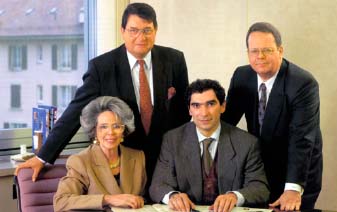
The ITU-Telecom Management Team. From left to right: Lili Rison, Vice-President, ITU-Telecom and
Head, Exhibitions Division, Jean-Patrick Baré, President, ITU-Telecom, Fernando Lagraña, Vice-President
ITU-Telecom and Head, Forum Division, and Tom Dahl-Hansen, Senior Vice-President ITU-Telecom, and Head, Business
Development and Marketing Division
Back to top

